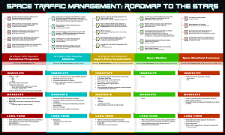Location
Jim Henderson Welcome Center, Embry-Riddle Aeronautical University - Daytona Beach
Start Date
5-11-2014 3:15 PM
Abstract
The late President Emeritus of the ICAO Council, Assad Kotaite, recommended a new annex to the Chicago Convention to extend ICAO responsibilities for producing International Standards and Recommended Practices (SARPs) for suborbital and orbital civil space flights[i]. Additionally, the U.S. Office of the Secretary of Defense and the European Union have independently conceived standards that have yet to mature to an amicable stage. This impetus to develop SARPs is growing more urgent as space becomes more congested, contested and competitive. In order to best determine how to mature internationally acceptable SARPs for seamless operations from tropospheric to exo-atmospheric flights without adversely impacting existing treaties, agreements or growth of the commercial space activity, the issue must be examined in the context of historical parallels of the 1947 establishment of the ICAO with recent, and achievable near-term, activities in the space domain. The current U.S. technological advantage in orbital tracking ability, conjunction summaries, and standing agreements for sharing space situational awareness data suggest the U.S. must take a leadership role in developing SAPRs for all four phases of aerospace operations. This role must not hinder compliance with established treaties while allowing for realistic timelines for evolution of awareness, regulation, enforcement, control mechanisms, responsibilities of existing organizations, space situational awareness technologies, and integration with world-wide air traffic, radio spectrum and orbital debris mitigation services and protocols.
[i] Jakhu, Ram; Sgobba, Tammaso; Dempsy, Paul, “The Need for An Integrated Regulatory Regime for Aviation and Space; ICAO for Space?”, Springer Wein, New York, 2011
Area of Interest
NAS Integration
Presentation
How to reach an International Civil Aviation Organization role in Space Traffic Management
Jim Henderson Welcome Center, Embry-Riddle Aeronautical University - Daytona Beach
The late President Emeritus of the ICAO Council, Assad Kotaite, recommended a new annex to the Chicago Convention to extend ICAO responsibilities for producing International Standards and Recommended Practices (SARPs) for suborbital and orbital civil space flights[i]. Additionally, the U.S. Office of the Secretary of Defense and the European Union have independently conceived standards that have yet to mature to an amicable stage. This impetus to develop SARPs is growing more urgent as space becomes more congested, contested and competitive. In order to best determine how to mature internationally acceptable SARPs for seamless operations from tropospheric to exo-atmospheric flights without adversely impacting existing treaties, agreements or growth of the commercial space activity, the issue must be examined in the context of historical parallels of the 1947 establishment of the ICAO with recent, and achievable near-term, activities in the space domain. The current U.S. technological advantage in orbital tracking ability, conjunction summaries, and standing agreements for sharing space situational awareness data suggest the U.S. must take a leadership role in developing SAPRs for all four phases of aerospace operations. This role must not hinder compliance with established treaties while allowing for realistic timelines for evolution of awareness, regulation, enforcement, control mechanisms, responsibilities of existing organizations, space situational awareness technologies, and integration with world-wide air traffic, radio spectrum and orbital debris mitigation services and protocols.
[i] Jakhu, Ram; Sgobba, Tammaso; Dempsy, Paul, “The Need for An Integrated Regulatory Regime for Aviation and Space; ICAO for Space?”, Springer Wein, New York, 2011



Comments
Click here for Stephen Hunter’s Bio Page